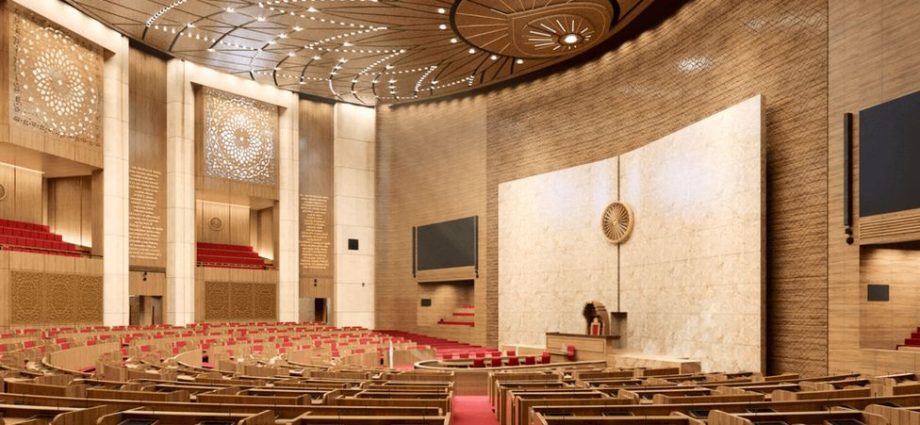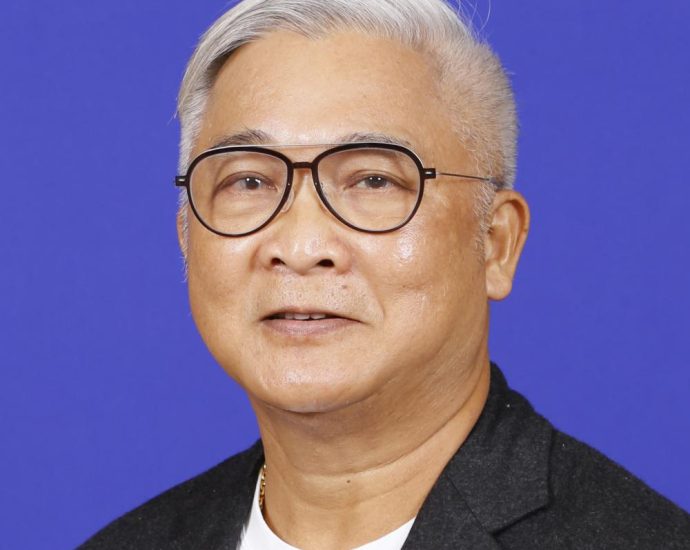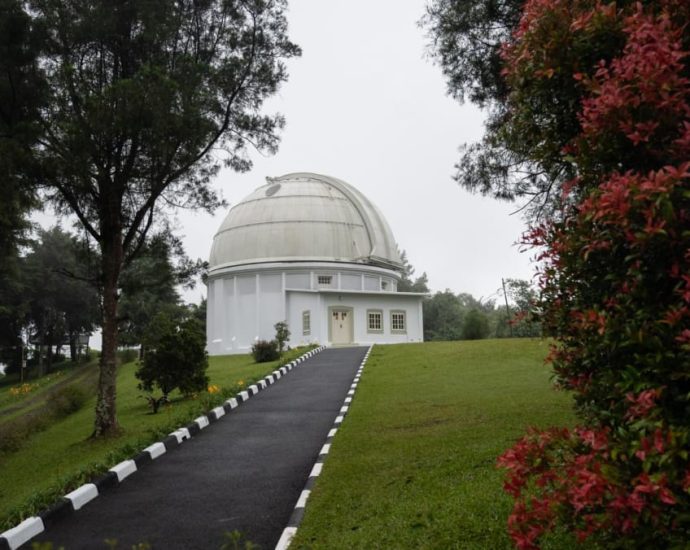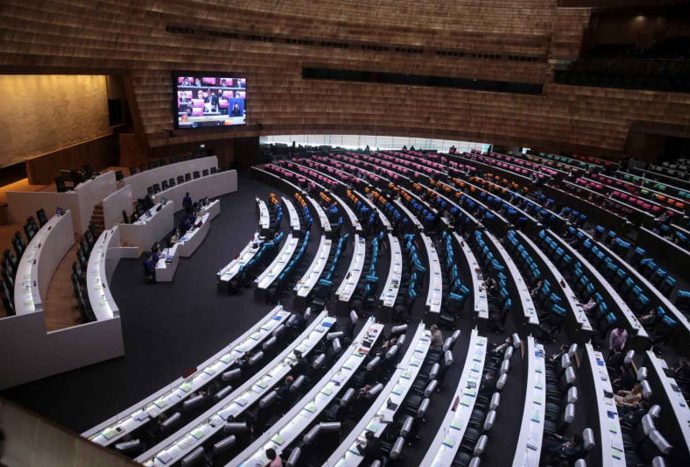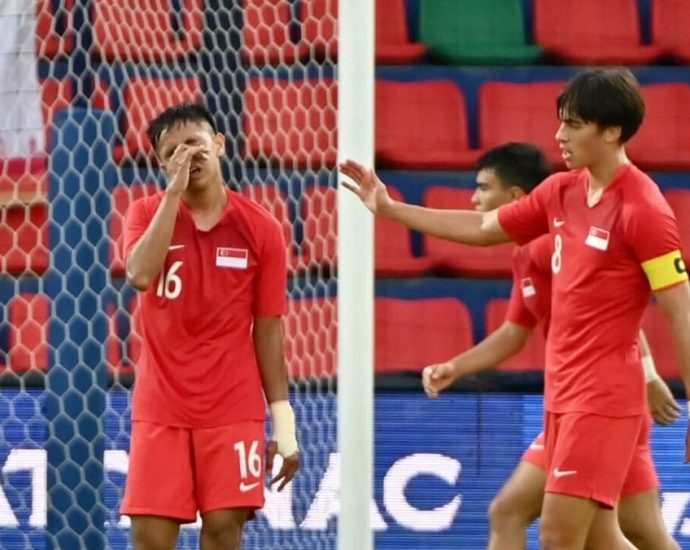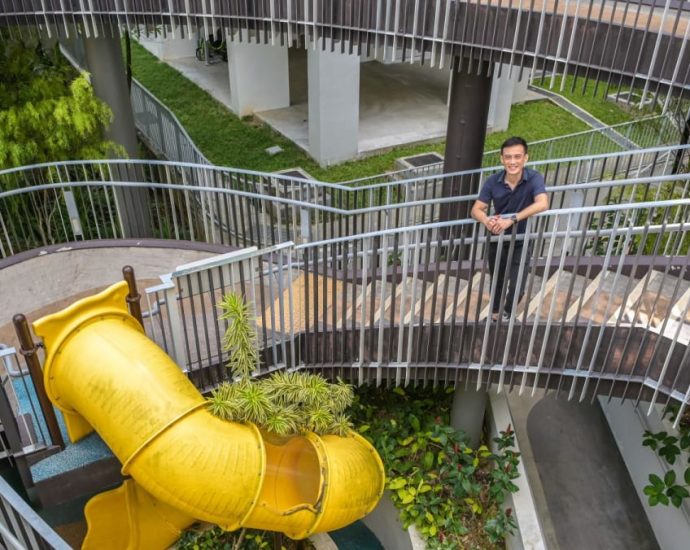New parliament: PM Modi set to inaugurate building amid Opposition boycott
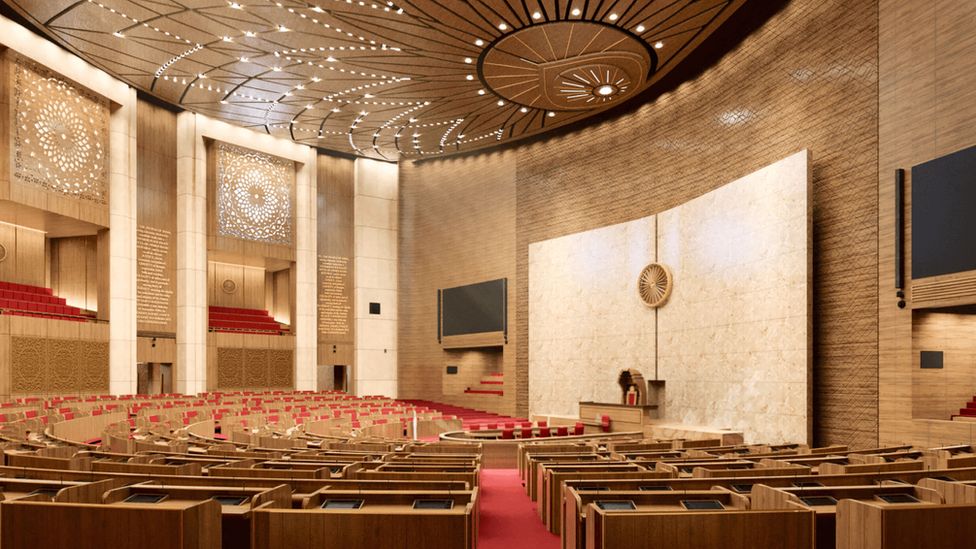 Government of India
Government of IndiaPrime Minister Narendra Modi is set to inaugurate India’s new parliament building despite a boycott of the ceremony by 19 opposition parties.
The opposition has criticised the government for not asking the president to open the new building.
They also denounced the decision to hold the event on the birth anniversary of Hindutva ideologue VD Savarkar.
The ruling Bharatiya Janata Party (BJP) has called the boycott a “disrespect of democracy”.
The new parliament building is part of the government’s ambitious project to develop the Central Vista power corridor in capital Delhi.
On Sunday, as the new building is inaugurated, Mr Modi will also unveil a new 75-rupee coin to commemorate the event and serve as a tribute to 75 years of India’s independence.
Built in front of the colonial-era parliament, the new four-storey building – built at an estimated cost of 9.7bn rupees ($117.1m, £94.2m) – has increased seating capacity.
The Lok Sabha chamber, which will seat the lower house of the parliament, is designed in the likeness of a peacock, India’s national bird. The Rajya Sabha chamber, which will seat the lower house, is designed resemble the lotus, India’s national flower.
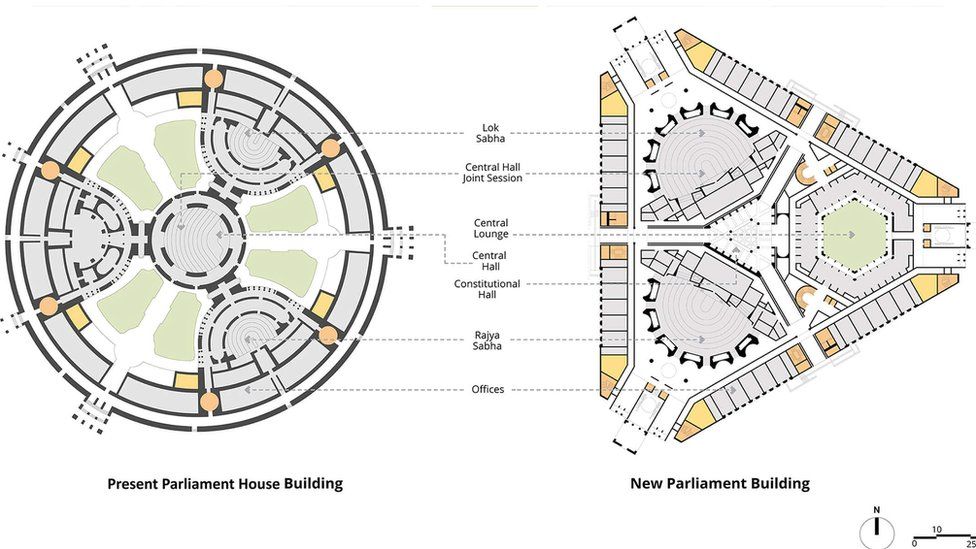
On Wednesday, 19 parties – including the main opposition Congress – announced their “collective decision” to boycott the inauguration ceremony.
Congress president Mallikarjun Kharge and party leader Rahul Gandhi said that the building should have been inaugurated by President Draupadi Murmu, the parliament’s highest constitutional authority.
Congress MP Jairam Ramesh also criticised the government’s decision to hold the event “on the birth anniversary of the man [Savarkar] who opposed Mahatma Gandhi vehemently all his life”.
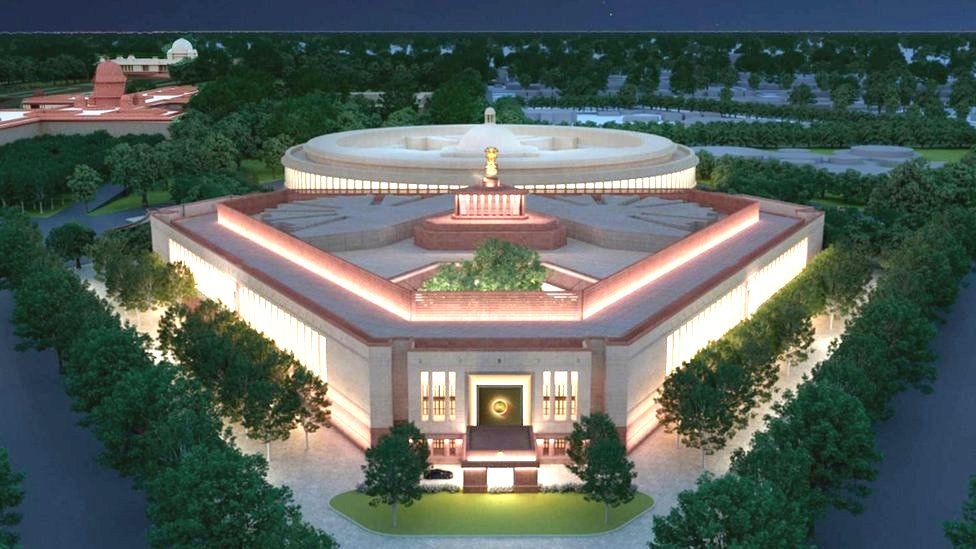
Commentators say the row reflects a fractious milieu where the ruling party and the opposition are unable to reach an agreement on most issues.
“Both sides need to find a way out of the separate corners they have backed themselves into. They must do so because history will not forgive them if they won’t,” The Indian Express newspaper argued in an editorial. “They must do so, for the sake of the people, and for the people’s parliament.”
As the new parliament is inaugurated, it will also witness protests by India’s top wrestlers outside the building.
The wrestlers, including Olympic medallists, have been on a months-long protest at Jantar Mantar, a heritage site in the capital Delhi, demanding the resignation and arrest of their wrestling federation president, Brij Bhushan Singh
Singh, an influential lawmaker and politician from BJP, is accused of sexual abuse and harassment of female wrestlers – allegations he denies.

Read more India stories from the BBC:
- Indian wrestler whose ‘marriage bout’ no one could win
- The man who made Hindu nationalist politics acceptable
- India and Australia announce migration deal
- Is India batter Shubman Gill cricket’s next big thing?
- Indian wrestlers risk Olympic dream for ‘#MeToo’ protest
- Political row over India’s new parliament openingIndian banks start exchanging withdrawn top currency

Related Topics
Industry up in smoke?

The memorandum of understanding (MoU) signed by eight prospective parties on forming a coalition government could be bad news for advocates of the current freer cannabis policy.
Under the 23-point agreement, the Move Forward Party-led bloc has agreed to reinstate the plant as a narcotic drug under the jurisdiction of the Ministry of Public Health and pass new laws supporting just certain beneficial uses while regulating all other use, cultivation, import and export of the plant.
The move marks a reversal of the cannabis policy which has become divisive and politicised due to the absence of an umbrella law to govern its use despite the introduction of regulations to prevent abuse, particularly by children.
With the sale of cannabis products spreading and a new industry flourishing in recent months, the prospective government will find it tough revoking the policy without stirring the pot among cannabis enthusiasts.
Cannabis use is ‘too liberal’
The proposed relisting of cannabis will allow authorities to work fully to control the abuse of cannabis, according to Pol Maj Gen Supisal Pakdinaruenart, a former list-MP for the MFP.
He said the absence of a specific law governing cannabis use has caused loopholes which prompted the Public Health Ministry to put cannabis on the list of controlled herbs under the Thai Traditional Medicine Protection and Promotion Act.
But many claim the move is insufficient to address concerns following the mushrooming of cannabis shops and the sight of people selling and smoking weed on the street, he said.
A cannabis cafe near a well-known all-girls school in the Silom area caused uproar and there is nothing authorities can do because there is no law controlling the location of such establishments.
“Cannabis buds are illegal while other parts can be used. But its use is way too liberal. Shops are popping up everywhere. This is against the objective, so many people want to recriminalise the plant,” said Pol Maj Gen Supisal, who is member of the House panel amending the narcotics laws.
He said people are not opposed to medical use of cannabis and it is better to issue clear-cut regulations supporting its beneficial uses rather than legalising the plant.
In his view, cannabis shops should not be allowed to open freely. Cannabis use must be supervised by doctors and cannabis-based products should face tighter regulations.
Asked about criticism that the cannabis policy is being politicised, he said: “Of course, we campaigned on it. It’s a political issue that we must push ahead and get it done. That’s the reason it’s there in the MoU.”

Supisal: Highlights lack of law
Relisting urged
Dr Adisak Plitapolkarnpim, director of Mahidol University’s National Institute for Child and Family Development (NICFD), said pediatricians support only medicinal uses to relieve pain, not recreational use.
However, decriminalisation has resulted in the widespread availability of cannabis-infused products and cannabis shops, and the regulations to control cannabis use are ambiguous, he said.
“It is against the law to sell cannabis products to pregnant women. Why don’t they entirely ban the use of cannabis in restaurants? Unlike cannabis use in the food industry which is regulated by the FDA, it’s hard to control cannabis use in food shops,” he said.
Asked about the economic impacts on entrepreneurs in the cannabis sector, Dr Adisak said he believes cannabis-related businesses are flexible and can adapt if cannabis is reclassified as a narcotic drug.
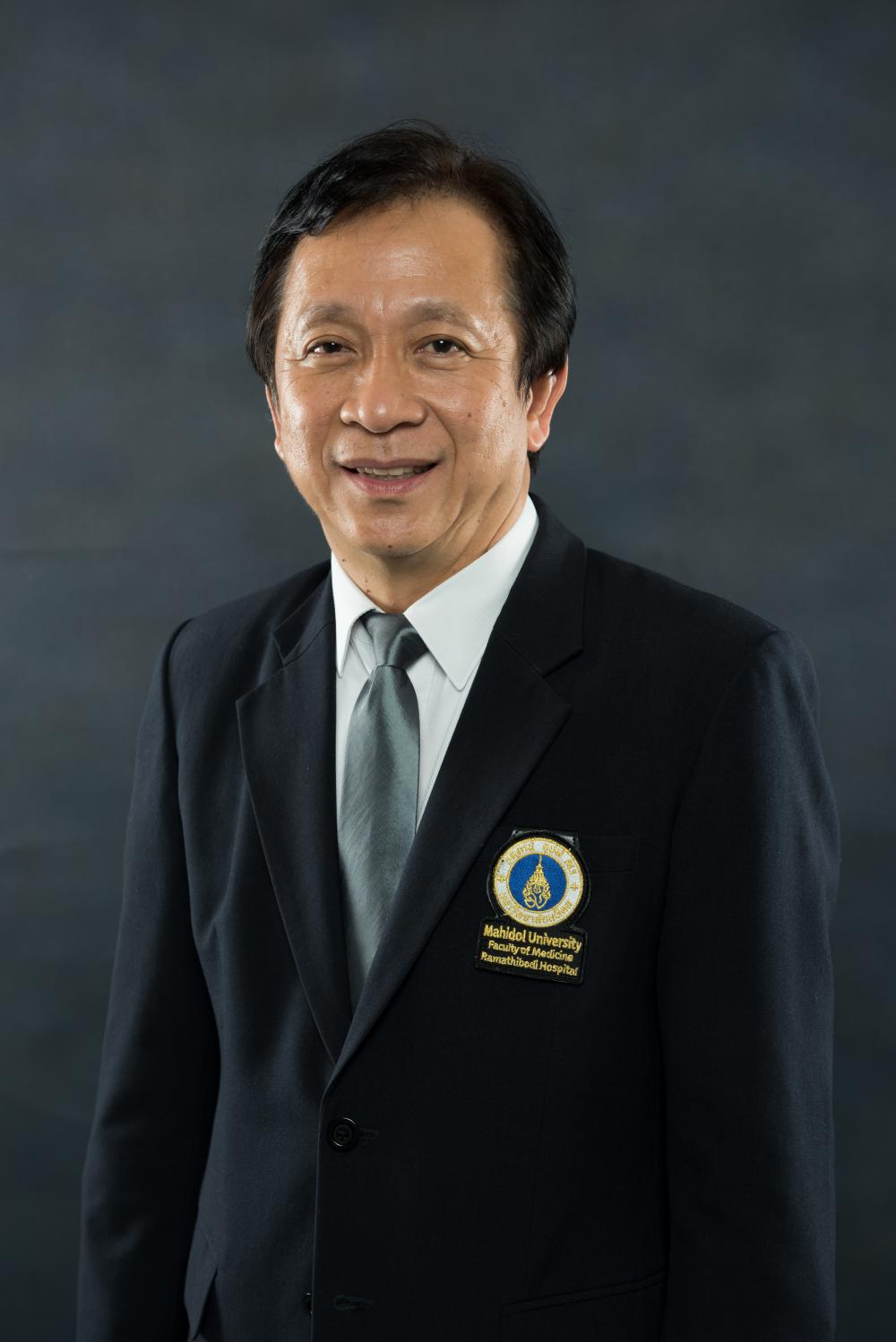
Adisak: ‘Hard to control eateries’
Sakulrat Thongtongkham, a 52-year-old office worker and mother of two, said reclassifying cannabis as a narcotic drug is a better option.
“When it was illegal, we didn’t see it being used like this. Now cannabis shops are all over the place…near schools, temples and communities. How can parents guard their kids when it can be accessed so easily?” she said.
She slammed parties that had advocated legalisation of cannabis without putting proper controls in place first, saying law enforcement is lax and state agencies are in the dark as to which regulations can be used to take action against vendors.
“I bet more than 90% is for recreational use. If it is for medical purposes, these shops must have doctors to prescribe it,” she said, adding that more measures such as zoning must be put in place to keep cannabis out of children’s reach for as long as this legal vacuum continues.
The public interest
Supachai Jaisamut, a member of the Bhumjaithai Party that successfully pushed for cannabis delisting and campaigned on the issue in the 2019 polls, said he was confident the bill pending House scrutiny will address such concerns.
The national committee on narcotic drugs will set guidelines for tetrahydrocannabinol (THC), the plant’s psychoactive ingredient. On criticism the current policy triggered an influx of illegally imported cannabis from abroad, he said the Customs Department must step up its efforts.
He said the value of cannabis-based products is estimated to be 40-50 billion baht, so it is best for all parties concerned to push for enactment of a law that allows cultivation for medical purposes and economic benefits.
Mr Supachai urged the MFP-led alliance and MFP leader Pita Limjaroenrat to stop politicising the issue and put the people’s interest before anything, as he warned of possible protests from advocates of the current policy.
“The best way forward is to get the bill passed. If there are flaws, address them. Make it complete. People will soon start questioning why the MFP wants to break up a monopoly there while leaving untouched alcohol which has no benefits. It looks like hypocrisy to them,” he said.
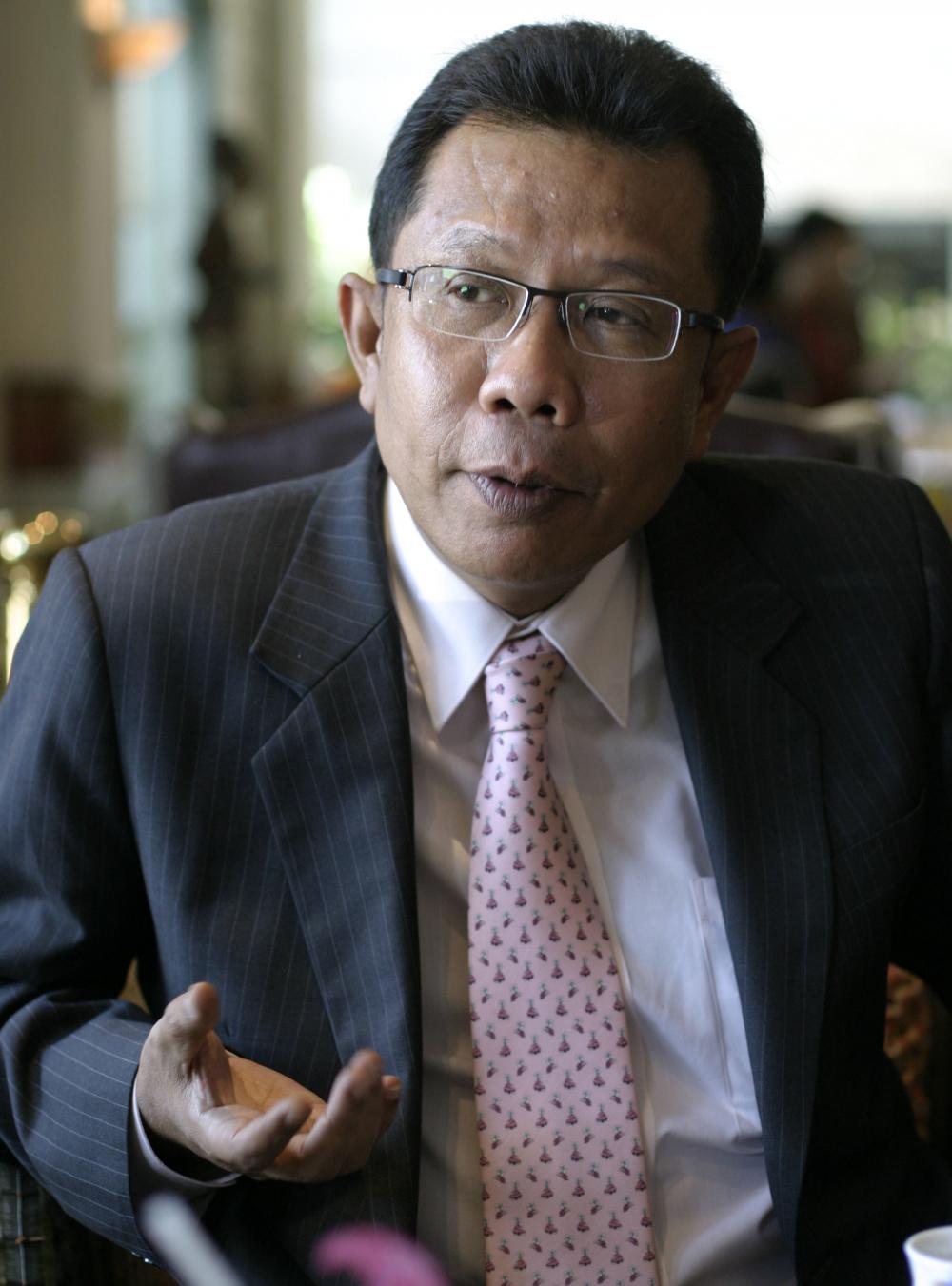
Supachai: ‘Stop politicising the issue’
Alcohol yes but cannabis, no?
Daycha Siripatra, founder of the Khaokwan Foundation, who has been a vocal supporter of medical marijuana, said there is no reason to support relisting of cannabis as a drug.
Citing research by the Ministry of Public Health, he said medical cannabis was effective in treating cancer, Parkinson’s disease and migraines in 80% of the people who used it as a treatment. Another study in the US also found a reduction in drinking and substance abuse in states where cannabis cultivation is allowed.
“What diseases can alcohol cure? But there is evidence medical cannabis can treat several diseases,” he said, referring to the MFP’s progressive liquor policy.
Mr Daycha suggested that a national referendum should be held on the cannabis policy.
He also criticised Mr Pita for going back on his word about cannabis, saying the MFP leader had joined his campaign to declassify the plant when he was an election candidate in 2019 and praised the benefits of the plant.
“Now you’re bidding for prime ministership and you’re saying cannabis is harmful and must be put back. How can this come from the same person? We won’t allow it because this is about people’s health.
“And I think you’d better control alcohol. If you’re concerned, enact a law to control it like we do tobacco and smoking,” he said.
An owner of a cannabis shop in Bangkok’s Sukhumvit area said any reversal of the policy would spell disaster for his business and more than 2,000 others across the country.
Zoning of cannabis shops should be introduced to address concerns, he said, adding some shops do not understand the regulations but said they are trying to comply as best as they can.
“It’ll be another disaster after the Covid-19 pandemic if there is a policy change,” he said.

Daycha: Suggests national referendum
A new tourism segment
Sanga Ruangwattanakul, president of the Khao San Business Association, said more than 40 cannabis-related operators are based in the area with initial investments of at least one million baht per business.
The economic value of cannabis-related businesses is estimated at 30 million baht per month, while the value of other businesses are 600 million baht per month, he said.
He said the current policy has drawn foreign visitors to Thailand who want to sample it for recreational use and seek it as an alternative treatment for illnesses. Entrepreneurs and investors see the potential of a new tourism sector, he said.
However, Mr Sanga said business operators are adopting a wait-and-see attitude after the MFP-led alliance announced a policy change which they believe would affect the country’s image and credibility.
He disagreed with relisting cannabis and urged the new government and lawmakers to move towards better regulation instead.
“The next part is to issue a law for better control, not for declaring it as illegal,” he said.
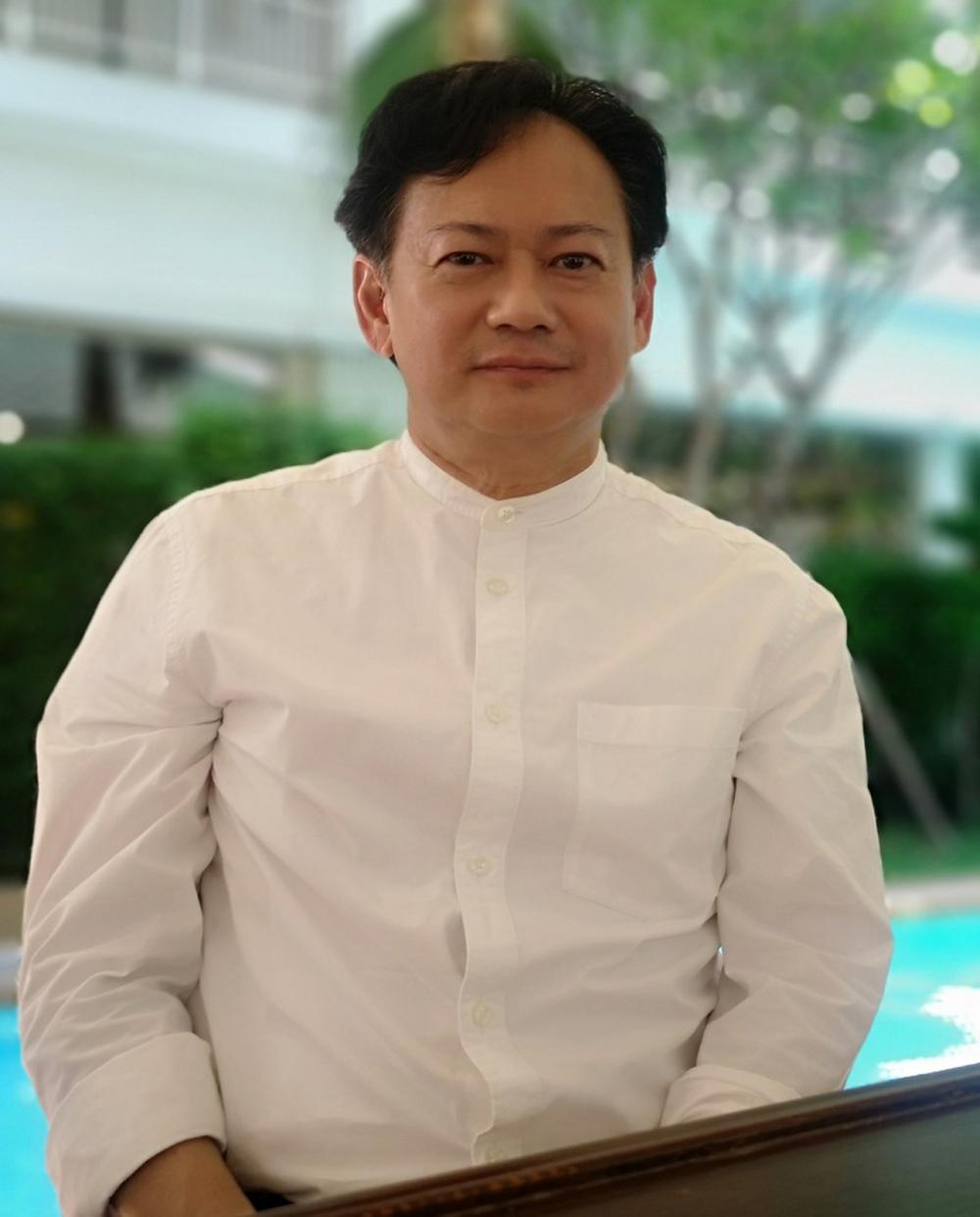
Sanga: Wants better regulations
Ex-accountant sells handmade beancurd with Taiwanese-style toppings at Hong Lim Market & Food Centre

FORMER ACCOUNTANT AND PART-TIME ADMIN EXEC
The couple graduated from Universiti Tunku Abdul Rahman in Ipoh with degrees in Commerce Accounting and Banking and Finance, but always dreamt of starting a food business together. The now-Singapore PRs relocated here eight years ago, where they worked corporate jobs in accounting and admin before calling it quits to chase their F&B dreams. Currently, Lau works full-time at DDSD, while Lee still works part-time in her admin job and tends the stall from 9am to 2pm.
Why sell beancurd? Lau said they “ate a lot of beancurd living in Ipoh”, and hence “know what the right texture” for the dessert should be. They learned how to make it with the help of “a few very good teachers – Google, YouTube and Xiaohongshu (a social media and e-commerce platform from China),” he added jokingly. He took a year to “measure every single (ingredient)” and formulate his recipes on Excel sheets, a skill he carried over from his years in accounting.
EARNING 75 PER CENT LESS THAN BEFORE
Lau told 8days.sg that they invested around S$20,000 into DDSD, and are paying over S$3,000 a month for rent. The duo aims to recover their costs in six months, but Lau shared that they’d only “managed to cover the rent” this past month. Unsurprisingly, he’s taken “more than a 75 per cent” pay cut.
The burden of infertility rests mainly on women â here’s what couples can do to bridge the gap

1. Communicate your feelings to your spouse
Infertility can bring up a range of emotions such as sadness, frustration, guilt and even anger – and women tend to experience this distress more intensely.
Dr Liu advises couples to express their feelings healthily and actively listen to each other without judgement. Open communication fosters understanding, empathy and mutual support during this challenging journey.
2. Learn how each individual reacts to stress
Infertility treatments and the emotional rollercoaster that comes with them can be stressful, so it’s useful for couples to understand how their other half copes with stress, Dr Liu said.
Some may prefer talking it out, while others may need space and time alone. Learning these differences can help you and your husband support each other better and create an environment that accommodates your spouse’s needs.
3. Spend more quality time with each other
Infertility can consume a couple’s life, but it’s crucial to make time for each other outside of medical appointments and treatments. Dr Liu recommends regular date nights or activities that you both enjoy.
The activities help strengthen your bond with your spouse, promote relaxation, and remind you both of the love and joy you share beyond the fertility journey.
4. Establish the same goals as a family
Discussing and aligning goals regarding family-building allows couples to approach problems better as a team, said Dr Liu. Be open about your desire for biological children, adoption, or other alternative paths. Find common ground and work together towards the same goals.
This shared vision helps couples support each other and make decisions as a united front, minimising potential conflicts or misunderstandings.
5. Find support beyond each other
Infertility is undoubtedly challenging, so seeking support from others who have gone through it can be helpful. Dr Liu recommends that a couple join support groups, attend counselling sessions, or connect with other couples in the same situation.
External support provides a safe space to share experiences, gain insights and find solace in knowing that you and your spouse are not alone in facing infertility issues.
Journo held for ‘exploiting police connection’
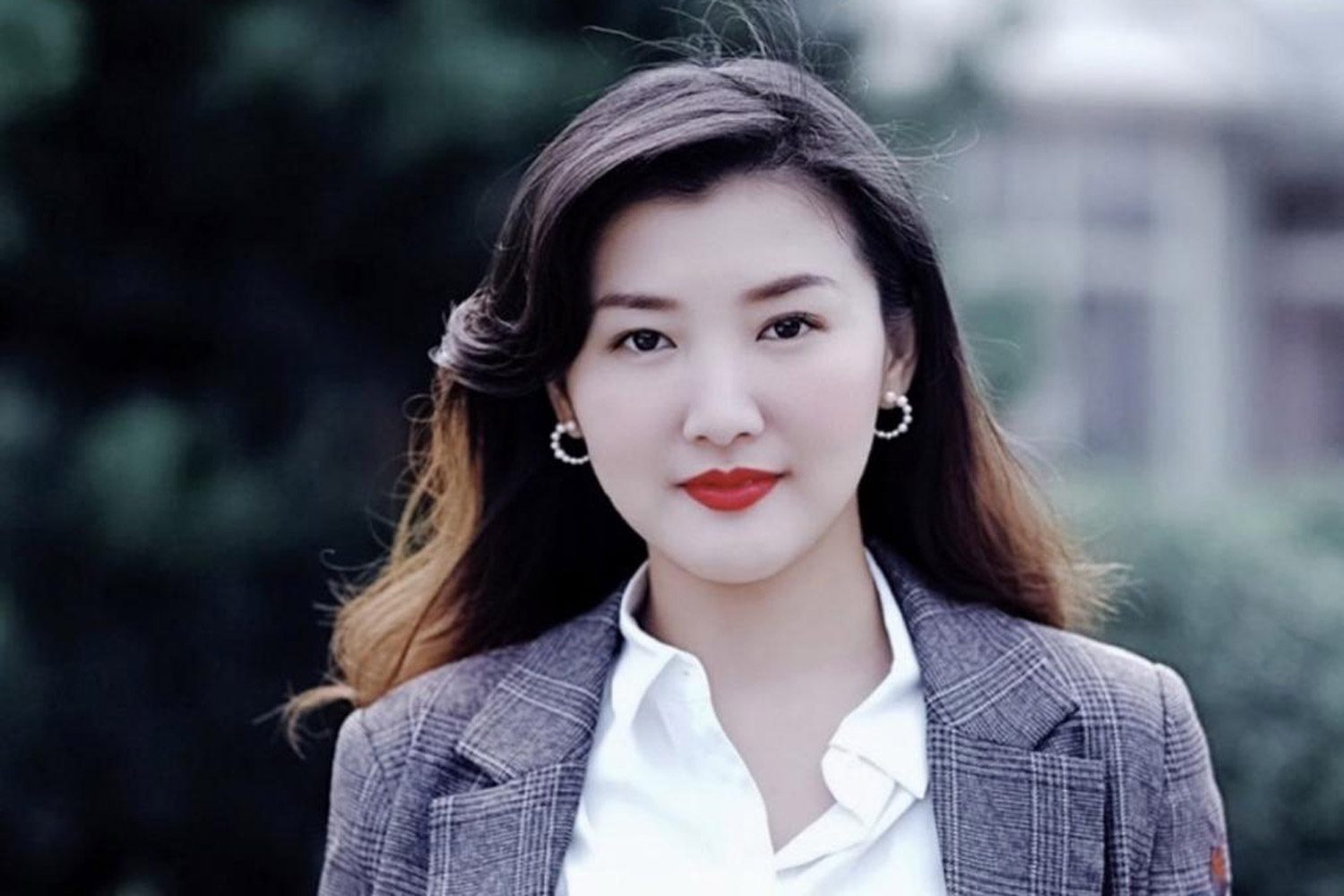
A journalist was arrested for allegedly using her connection with a senior police officer to demand 14 million baht from a Chinese suspect in exchange for having charges dropped.
The arrest was unveiled on Saturday by national deputy police chief Pol Gen Surachate Hakparn, who said the woman, identified as Guo Rui, or Gegee, exploited her working relationship with police to demand bribes.
He said he knew the journalist from work and that she was employed by the police as a coordinator due to her fluency in the Chinese language and overseas connections.
Pol Gen Surachate said police started an investigation after learning about her intentions and sought an arrest warrant after gathering evidence.
Guo, who was also chair of the Thai Jiaranai Group, a media company that owns Thailand Headlines, was arrested on Friday at her condominium.
Pol Gen Surachate said the suspect told Navaporn Phakiatsakul, a key suspect in a crime syndicate probe, that she could have charges against her dropped for an initial offer of 33 million baht.
Ms Navaporn instead paid Guo 14 million baht, he said.
Ms Navaporn was arrested in early April following a crackdown.
Inquiries showed she had a long history of fraudulent behaviour, human trafficking, surrogacy and document forgery.
Pol Gen Surachate vowed to take legal action against anyone using his name to demand bribes. Those found guilty of demanding bribes face a maximum fine of 100,000 baht or a jail sentence of up to five years.
A police source said Guo denied the charge and that she was temporarily released on a 3.5-million-baht bail.
The source said Guo worked as an interpreter for Pol Gen Surachate in a gun theft case in Nonthaburi.
Indonesiaâs oldest observatory losing its shine as tourism brings light pollution
Observation of the night sky, she said, can only begin after 11pm, granted that the sky is clear. Even then, scientists can only observe stars at an angle of more than 30 degrees above the horizon. If the telescopes are aimed any lower, the celestial objects would be completely awashContinue Reading
MFP, Pheu Thai to huddle over House Speaker post row

The Move Forward Party (MFP) and Pheu Thai Party will thrash out their differences over the House Speaker post, a position both parties have been aiming to fill, at a meeting with all eight prospective coalition partners on Tuesday.
The conflict over who should get the House Speaker position has raged on for days in interviews and on social media, prompting MFP leader and prime minister candidate Pita Limjaroenrat to come out on Friday to call on the coalition partners to remain united and settle the matter in talks.
Chaithawat Tulathon, MFP secretary-general in his capacity as party coordinator working on formation of an MFP-led coalition government, on Saturday said the discussion is expected to begin at 2.30pm at Prachachart Party headquarters. Mr Pita has stressed the importance of all coalition parties taking part, Mr Chaithawat said.
The meeting was initially intended to serve as a forum for the parties to discuss who will implement parts of a memorandum of understanding jointly signed on Monday, he said.
The MoU, signed by MFP and its coalition partners, sets out the policies they have agreed on so a government can be formed.
Discussions about the allocation of cabinet portfolios will follow Tuesday’s meeting, Mr Chaithawat said, adding some cabinet ministers in the MFP quota will also include outsiders who are deemed suitable.
The MFP has yet to formally begin internal discussions on who will hold which cabinet positions, he said. The allocation of cabinet portfolios could serve as more fertile ground for disputes, with Pheu Thai likely to ask for key jobs, based on their strong election night showing, just as they did the speaker’s job.
Prasert Chantararuangthong, Pheu Thai secretary-general, said both parties are expected to settle the House speakership matter this week. He said he was optimistic the talks would yield a fruitful result so that a vote to select a new House Speaker wouldn’t be necessary.
Mr Prasert said the dispute between the MFP and Pheu Thai over the speaker post was unlikely to lead to a serious rift or bar them from working together as a coalition.
Suchart Tancharoen, an elected list-MP of Pheu Thai and ex-deputy House Speaker, however, said some remarks by the MFP about the role of the House Speaker might have misguided people about the importance of this position.
In the past, a House Speaker wasn’t from a party that won a majority, but someone who was elected by fellow MPs, he said. More importantly, the speaker must always follow regulations and not be biased against bills proposed by other parties, he said.
Deputy MFP leader Nutthawut Buaprathum said he is confident the matter will be sorted out.
“Pheu Thai will never pull out and leave any opportunity for a dictator regime to return, for the sake of our [voters],” he said on Facebook.
Commentary: 70 years after the first ascent of Everest, the impact of mass mountaineering must be confronted

HAIKOU, Hainan: Mountains – their height, their mass, their climates and ecosystems – have fascinated humans for thousands of years. But there is one that holds extra special meaning for many – Mount Everest, or Chomolungma as the Nepalese Sherpa people call it.
A sacred mountain for some, for others the world’s highest peak represents a challenge and a lifelong dream. Seventy years ago, on May 29, 1953, that challenge and dream became reality for two members of a British expedition: New Zealander Edmund Hillary and Sherpa Tenzing Norgay became the first people to reach the 8,848.86m summit.
Their achievement was a testament to endurance and determination. It was also the crowning glory of the British expedition’s nationalistic motivations on the eve of the young Queen Elizabeth’s coronation.
From our vantage in the present, it also represents a high point, not just in climbing terms, but in what we now think of as the modern era of mountaineering. Since then, mountaineering has become massively popular and commercial – with serious implications for the cultures and environments that sustain it.
SCALING THE HEIGHTS
The early mountaineering era began in 1786 when Jaques Balmat and Michel Paccard reached the summit of Mont Blanc, the highest peak in the European Alps at 4,808m. From 1854 to 1899 (known as the classic mountaineering period), advances in climbing technology saw ascending peaks by challenging routes become possible and popular.
During the modern era from 1900 to 1963, mountaineers pushed further into the Andes Cordillera in South America, explored polar mountains and began high-altitude climbing in Central Asia.
Heart of the Matter: FAS to leave âno stone unturnedâ after Singapore football squad review

SINGAPORE: When the Young Lions came off the field after a 7-0 drubbing by Malaysia, the brickbats came fast and furious. For seasoned sports journalist Philip Goh, that result summed up the growing chasm of football standards between both countries.
“We’ve been losing at the age group competitions for quite a while now. Every single age group competition that we go to, we seem to come back with very adverse results.
“(The Malaysians) are continuing to progress, but we’ve been regressing,” said Mr Goh, on the latest episode of the Heart of the Matter podcast.
Mr Bernard Tan, acting president of the Football Association of Singapore (FAS), who was also a guest on the show, did not refute Mr Goh’s observation. He agreed that the younger age groups have not been doing well in tournaments and the key is to find out why.
On the SEA Games loss, he told host Steven Chia: “Never in our wildest dreams (did we think) we would lose 7-0 … some of them can’t really explain what went wrong on the field … the technical team (needs time) to really ask ourselves, what really went wrong?”
From sky terraces to sea views: What goes into designing HDB blocks
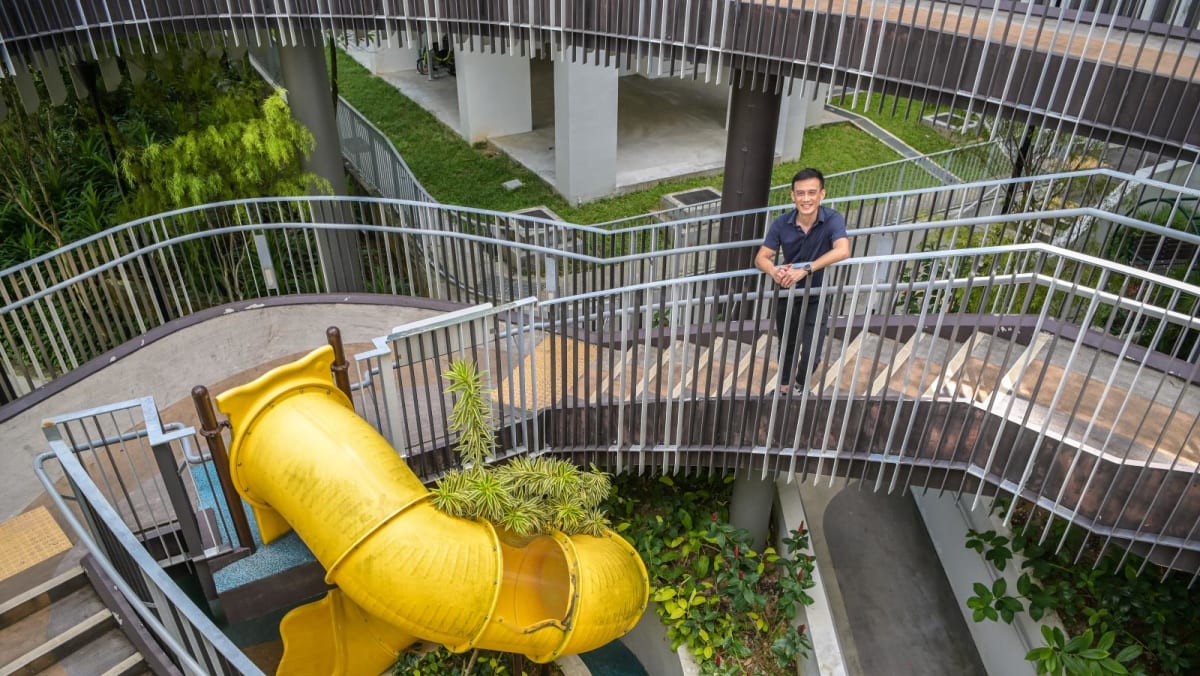
Precast technology is where the building components are manufactured off-site, and then delivered and assembled on-site. To maximise the use of casting moulds for greater cost-effectiveness, each mould is typically used at least 100 times for HDB BTO developments.
To allow more flexibility in design, HDB has developed a Smart Base Mould for precast facades, which comes with adjustable sides and attachments that can be added.
Based on this Smart Base Mould, the Eastlink team designed a mould with moveable parts, said Mr Leong. This helped the architects achieve a “sense of movement” in an otherwise “rigid” facade.
BUILDING REQUIREMENTS, DESIGNING GUIDELINES
For each project, HDB provides architecture teams with specifications such as the number of homes to be built and the type and quantity of flat types. Facilities required are also listed; this can include playgrounds, fitness corners, pavilions and commercial spaces.
The design brief also covers the building form and layout, pedestrian and vehicular connectivity, layouts for various flat types and regulatory and technical requirements.
These requirements help architects shorten their design time as they do not have to create their own layouts from scratch, said HDB.
“The consistency of flat layouts also allows for standardisation of structural, architectural as well as mechanical and electrical components, which in turn helps to enhance the efficiency and speed of construction.”
Regulations are also in place to ensure homes are more sustainable than before. For example, all new public housing projects since 2014 have to provide centralised chutes for recyclable waste, regenerative lifts and energy-saving light fittings in common areas.
Other guidelines the architects have to take into account include keeping the design consistent with HDB’s vision for the town. The theme and identity of the town percolate through the housing projects, influencing the colour palette, designs of playgrounds, fitness corners and signs.

